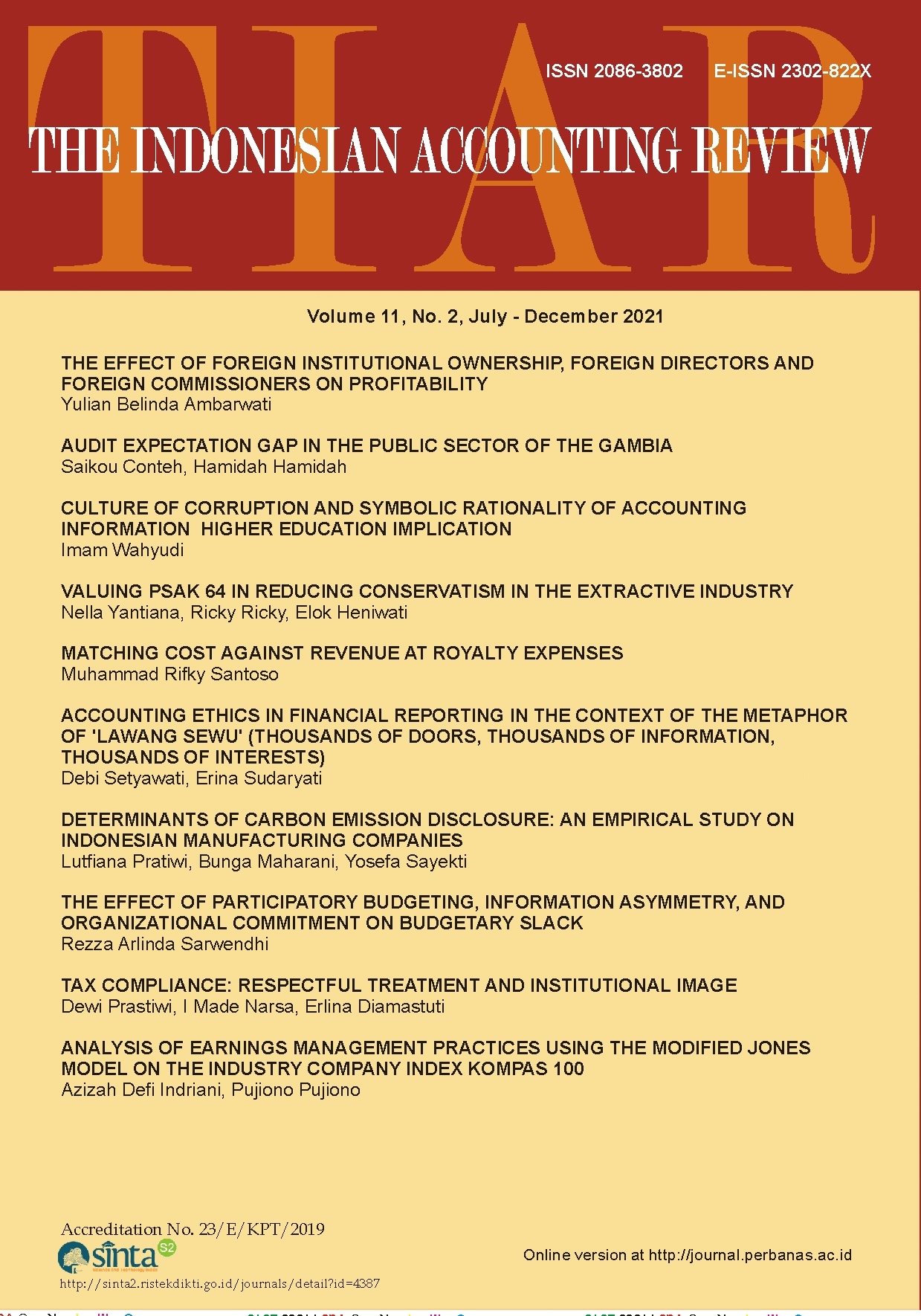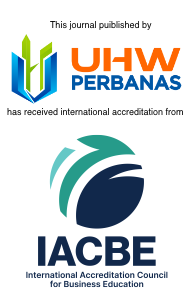Audit Expectation GAP in The Public Sector of The Gambia
DOI:
https://doi.org/10.14414/tiar.v11i2.2489Keywords:
Audit, Expectation Gap, Gambia, Public SectorAbstract
In the private sector, the audit expectations deficit is a big concern. The audit expectations divide, on the other hand, is a new problem in the public sector that has received little attention from researchers. Just a few studies on the audit expectations deficit in the public sector have been conducted so far in the sense of financial audit. In the background of the above, this study centered on the audit expectations difference. The study was motivated by the importance of the financial audit feature in the Gambian public sector, as well as recent developments related to this type of audit in the country (such as rising expectations among users and associated problems in practice). As a result, the study aims to assess whether or not there is a difference in audit expectations in the Gambian public sector. According to the results of this report, there is an audit expectations deficit in the Gambian public sector when it comes to performance auditing. Interviews indicate that there is a broad gap in audit standards on several auditing topics. These include fraud detection exercises, management, executive and other parties' impact on auditors, audit report format, and widening the audit mandate to include policy merits.
References
Chowdhury, R. R., Innes, J., & Kouhy, R. (2005). The public sector audit expectations gap in Bangla-desh. Managerial Auditing Journal, 20(8), 893–908. https://doi.org/10.1108/02686900510619719
Chye Koh, H., & Woo, E. S. (1998). The expectation gap in auditing. Managerial Auditing Journal, 13(3), 147–154. https://doi.org/10.1108/02686909810208038
CRESWELL, J. W. (2012). Research Design, Qualita-tive, Quantitative, and Mixed Method Ap-proaches. Sage Publication,Inc. (Vol. 4th Editio).
Dahrendorf, R. (2006). Conflict and Critical Theories. Conflict and Critical Theories, 211–241. Re-trieved from https://us.corwin.com/sites/default/files/upm-binaries/13636_Chapter7.pdf
Daud, Z. M. (2019). The study of the audit expecta-tions gap in the public sector of Malaysia De-partment of Accounting & Finance THE STUDY OF THE AUDIT EXPECTATIONS GAP IN The-sis submitted to Department of Accounting and Finance Doctor of Philosophy, (November).
Devi, A., & Devi, S. (2014). Audit Expectation Gap between Auditors and Users of Financial State-ments. European Journal of Business and Man-agementOnline), 6(14), 2222–2839.
Dibia, N. O., & Acti, C. (2015). Audit Expectations Gap and Perception of Financial Reporting. In-ternational Journal of Managerial Studies and Research, 3(3), 23–31. Retrieved from www.arcjournals.org
Dixon, R., Woodhead, A. D., & Sohliman, M. (2006). An investigation of the expectation gap in Egypt. Managerial Auditing Journal, 21(3), 293–302. https://doi.org/10.1108/02686900610653026
Djamhuri, A., & Andayani, W. (2017). THE PUBLIC SECTOR AUDIT EXPECTATIONS GAP IN IN-DONESIA : PAPUA, (February 2019). https://doi.org/10.18551/rjoas.2017-12.16
Etim, R. S., Jeremiah, M. S., & Jeremiah, O. O. (2020). Auditors’ Opinion: The Paradox of “True and Fair View†of Financial Statements. European Journal of Business and Management Research, 5(2), 1–4. https://doi.org/10.24018/ejbmr.2020.5.2.237
Frank, Y. G. (2015). Audit expectation gap and MBA accounting students knowledge on auditor(s) responsibilities: Evidence from a public univer-sity in Kumasi Ashanti Region of Ghana. Jour-nal of Accounting and Taxation, 7(4), 53–61. https://doi.org/10.5897/jat2015.0169
Fulop, M. T., Tiron-Tudor, A., & Cordos, G. S. (2019). Audit education role in decreasing the expecta-tion gap. Journal of Education for Business, 94(5), 306–313. https://doi.org/10.1080/08832323.2018.1527752
Füredi-Fülöp, J. (2015). An Empirical Study of Audit Expectation Gap in Hungary. Theory, Method-ology, Practice, 11(1), 37–46. https://doi.org/10.18096/tmp.2015.01.04
Füredi-Fülöp, J. (2017). Factors Leading to Audit Expectation Gap: An Empirical Study in a Hungarian Context. Theory, Methodology, Prac-tice, 13(2), 13–23. https://doi.org/10.18096/tmp.2017.02.02
Guba, E. G. and Lincoln, Y. S. (1998). Competing paradigms in qualitative research in Denzin, N. K. and Lincoln, Y. S. (eds). The Landscape of Qualitative Research: Theories and Issues, Thousand Oaks, CA: Sage Publications
Humphrey, C., Moizer, P., & Turley, S. (1993). The Audit Expectations Gap in Britain: An Empiri-cal Investigation. Accounting and Business Re-search, 23(sup1), 395–411. https://doi.org/10.1080/00014788.1993.9729907
Humphrey, C., & Owen, D. (2000). Debating the “Power†of Audit. International Journal of Au-diting, 4(1), 29–50. https://doi.org/10.1111/1099-1123.00302
Ittonen, K. I. M. (2010). A Theoretical Examination of the Role of Auditing and the Relevance of Audit Reports. Business Administration, 28, 1–70.
Kebbeh, D. C. M. (2015). National Audit Office ACT, 2015. Journal of Chemical Information and Modeling, 53(9), 1689–1699.
Köse, Y., & Erdogan, S. (2015). The Audit Expecta-tions Gap in Turkey. The Journal of Accounting and Finance (Muhasebe ve Finansman Dergisi), 193–214.
Liggio, C. D. (1974). The expectation gap: The ac-countant’s legal Waterloo? Journal of Contem-porary Business, Vol. 3, pp. 27-44
Lin, Z. J., & Chen, F. (2004). An Empirical Study of Audit ‘Expectation Gap’ in The People’s Repub-lic of China. International Journal of Auditing, 115, 93–115.
Litjens, R., van Buuren, J., & Vergoossen, R. (2015). Addressing Information Needs to Reduce the Audit Expectation Gap: Evidence from Dutch Bankers, Audited Companies and Auditors. In-ternational Journal of Auditing, 19(3), 267–281. https://doi.org/10.1111/ijau.12042
Lowe, J. (2011). The Expectation Gap In The Legal System: Perception Differences Between Audi-tors And Judges. Journal of Applied Business Research (JABR). https://doi.org/10.19030/jabr.v10i3.5922
Mahdi, S. (2011). Audit expectation gap: Concept, nature and trace. African Journal of Business Management, 5(21), 8376–8392. https://doi.org/10.5897/ajbm11.963
Masoud, N. (2017). An empirical study of audit ex-pectation-performance gap: The case of Libya. Research in International Business and Finance, 41(June 2016), 1–15. https://doi.org/10.1016/j.ribaf.2017.04.012
McDonnell, A., Jones, M. L., & Read, S. (2000). Practi-cal considerations in case study research: The relationship between methodology and process. Journal of Advanced Nursing, 32(2), 383–390. https://doi.org/10.1046/j.1365-2648.2000.01487.x
McEnroe, J. E., & Martens, S. C. (2001). Auditors’ and investors’ perceptions of the “expectation gap.†Accounting Horizons, 15(4), 345–358. https://doi.org/10.2308/acch.2001.15.4.345
Nazri Fadzly, M., & Ahmad, Z. (2004). Audit expec-tation gap: The case of Malaysia. Managerial Auditing Journal, 19(7), 897–915. https://doi.org/10.1108/02686900410549420
Olojede, P., Erin, O., Asiriuwa, O., & Usman, M. (2020). Audit expectation gap: an empirical analysis. Future Business Journal, 6(1). https://doi.org/10.1186/s43093-020-00016-x
Porter, B. (1993). An Empirical Study of the Audit Expectation-Performance Gap. Accounting and Business Research, 24(93), 49–68. https://doi.org/10.1080/00014788.1993.9729463
Pourheydari, O., & Abousaiedi, M. (2011). An empir-ical investigation of the audit expectations gap in Iran. Journal of Islamic Accounting and Business Research, 2(1), 63–76. https://doi.org/10.1108/17590811111129517
Quick, R. (2020). The audit expectation gap: A re-view of the academic literature. Maandblad Voor Accountancy En Bedrijfseconomie, 94(1/2), 5–25. https://doi.org/10.5117/mab.94.47895
Ruhnke, K., & Schmidt, M. (2014). The audit expecta-tion gap: Existence, causes, and the impact of changes. Accounting and Business Research, 44(5), 572–601. https://doi.org/10.1080/00014788.2014.929519
Salehi, M. (2016a). Quantifying Audit Expectation Gap : A New approach to Measuring Expecta-tion Gap, 19(1), 25–44. https://doi.org/10.1515/zireb-2016-0002
Salehi, M. (2016b). Quantifying Audit Expectation Gap: A New approach to Measuring Expecta-tion Gap. Zagreb International Review of Eco-nomics and Business, 19(1), 25–44. https://doi.org/10.1515/zireb-2016-0002
Salifu, I., & Mahama, M. (2015). The Evaluation of Evidence of the Audit Expectation Gap in Gha-na. Research Journal of Finance and Accountin-gOnline), 6(24), 2222–2847. Retrieved from http://citeseerx.ist.psu.edu/viewdoc/download?doi=10.1.1.736.833&rep=rep1&type=pdf
Sikhungo Dube, & Daniela Danesc. (2011). Supple-mental Guidance: Public Sector Definition. The Institute of Internal Auditors, 1–6.
Tahawa, Taufik H., Nurhidayah, Tanra, Andi Ainil, & Khaldun, R. I. (2020). Fraud trend in the re-gional government of Central Sulawesi Prov-ince. The Indonesian Accounting Review, 10(1), 51–58. https://doi.org/10.14414/tiar.v10i1.1850
Downloads
Additional Files
Submitted
Published
How to Cite
Issue
Section
License
Copyright (c) 2021 The Indonesian Accounting Review

This work is licensed under a Creative Commons Attribution-NonCommercial 4.0 International License.

















